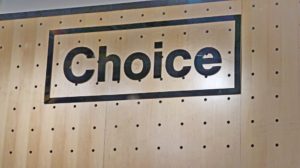 When I hear leaders say, “I have no choice,” I always remind them that in fact, they do. Everything we do in life is a choice, albeit sometimes the lesser of two evils, we always do have a choice. One of my favorite books called, “What Happy People Know,” discusses that one of the most critical differences between happy people and unhappy people is the belief that they have a choice. Unhappy people really believe they have no choice. So why does this paradox exist?
When I hear leaders say, “I have no choice,” I always remind them that in fact, they do. Everything we do in life is a choice, albeit sometimes the lesser of two evils, we always do have a choice. One of my favorite books called, “What Happy People Know,” discusses that one of the most critical differences between happy people and unhappy people is the belief that they have a choice. Unhappy people really believe they have no choice. So why does this paradox exist?
Personally, I think one of the biggest reasons for this is people frequently don’t want to take responsibility for the consequences of their decisions. By using the phrase, “I have no choice,” the consequences can be put on someone or something else. When a leader abdicates responsibility for his or her choice, they cease to lead. Nobody likes being wrong, hurting someone else, being seen as weak, etc., so the safe option is to say “I had no choice” thereby completely absolving oneself from responsibility for consequences. This is weak leadership. Strong leaders own their choices, recognizing at all times they are the ones making the choices. Not someone else.
So how do we shift our consciousness to realize that everything is a choice and that the possibilities are infinite? Sometimes not always great, but always endless. It starts with ownership and a realization that in the moment of decision – we own it. No one else, just us. In order to make the best decision, our decision, we need to look at all aspects.
- What is the purpose of what we are trying to achieve or decide?
- What outcome do we hope for?
- Who else should have input?
- What options do I/we have?
- What are the consequences of each choice?
After the analysis, it usually comes down to a couple of options and sometimes only one will rise to the top of the decision matrix. This becomes your choice – not the only choice but your choice. You decided not to pick the others, so this clearly became the choice. Don’t minimize it by saying I had no choice, you did.
Even in very bad circumstances, you have a choice as to how you feel about something. You can choose victimhood – “it happened to me” – versus it happened and I can choose how I feel about it. Seeing a lesson in it is also a choice, choosing to let it rule your emotions is another one. The problem is we don’t always own our choices – ever heard someone say, “it’s out of my hands?” That’s actually a choice. You could have said, I gave my input and have chosen to abide by whatever is decided. Which is more empowering?
As leaders, it’s up to us to set the example. Owning one’s choices, and how you choose to react to those choices is leadership. If we want to have more accountable and responsible workforces, which leadership example will you use?
photo credit: Paul Iwancio IMG_3081 via photopin (license)</a
